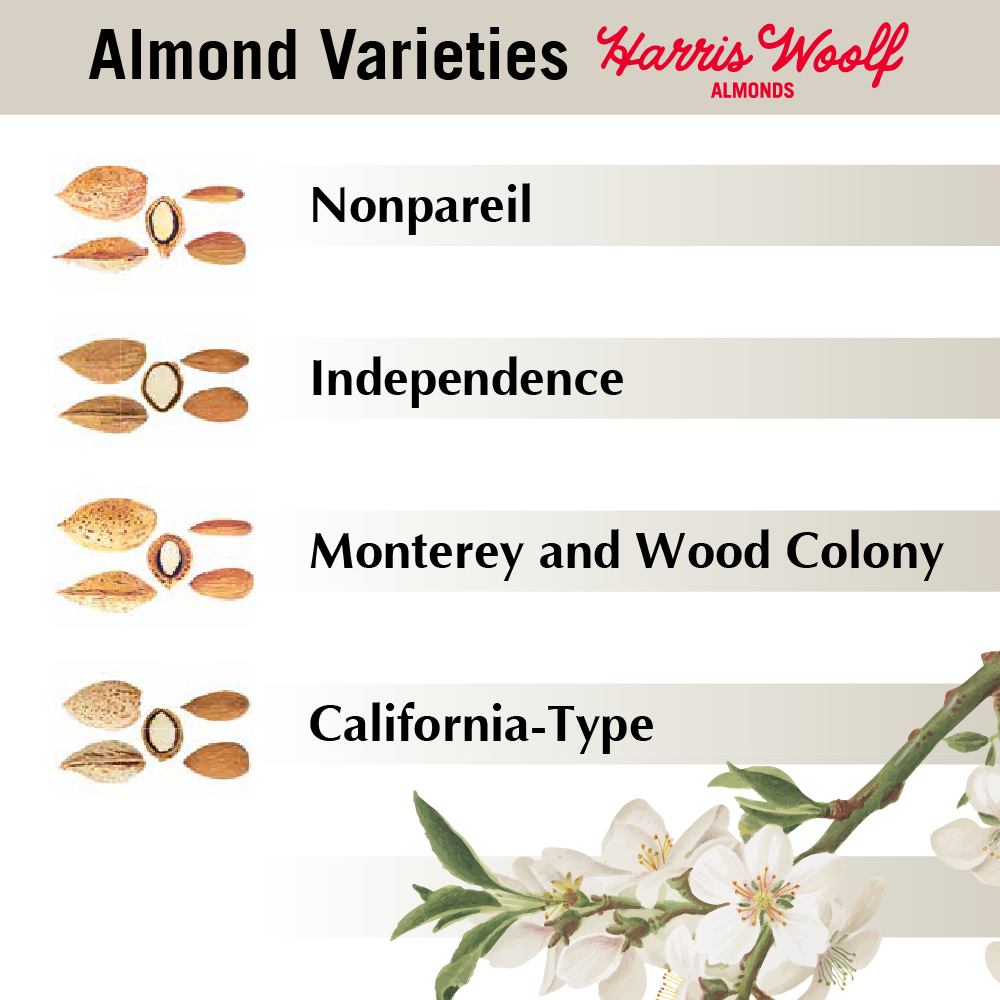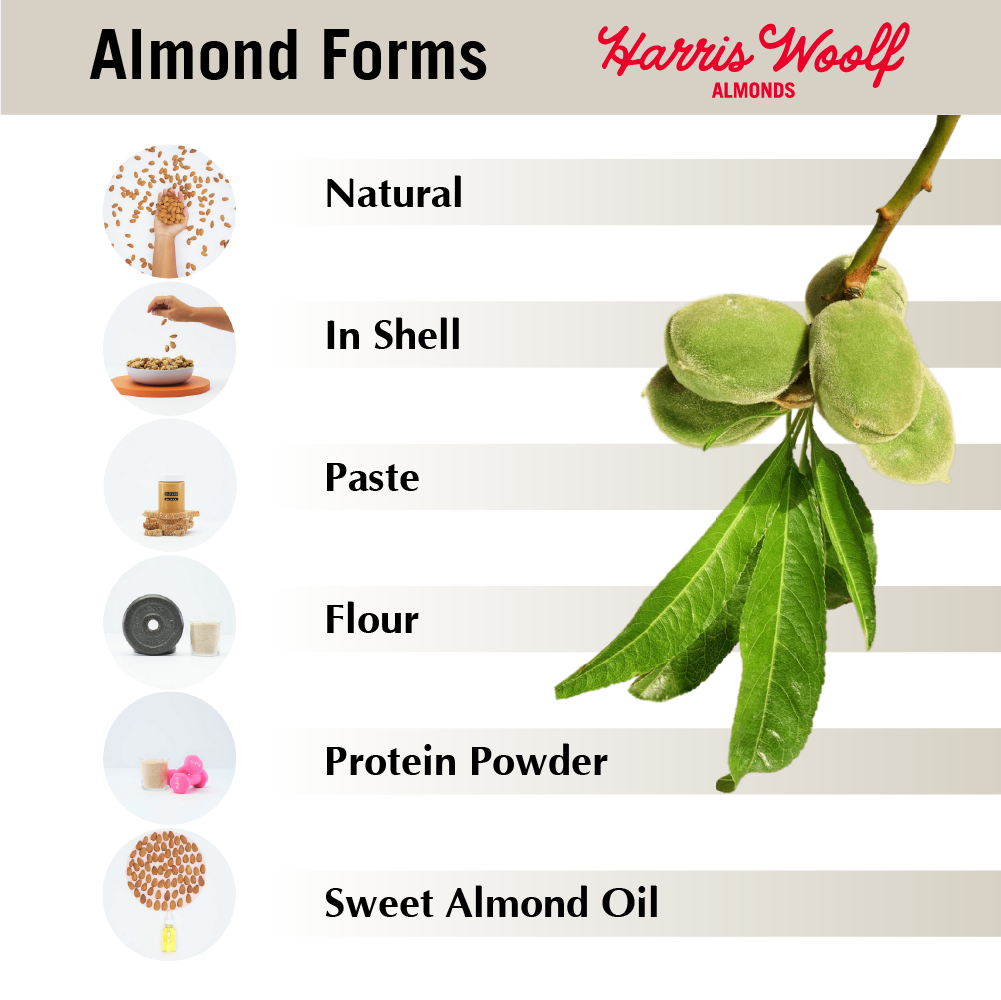






Almonds are one of the best snacks for consumers looking to add healthy fats, protein, vitamins, and minerals to their diets. They're also picture-perfect ingredients for manufacturers looking to add nutritional value to their products. These versatile and well-known tree nuts are popular around the world, but many consumers and manufacturers might not know how many different types of almonds are out there. Let's explore some of the many almond varieties and use cases, but first, an overview of almonds.
What Are Almonds?
The almond, Prunus dulcis, tree is native to western Asia. Almonds are the edible nut produced by these trees and come in a variety of shapes, sizes, and varieties.
Today, you'll find almond trees commercially grown throughout the world in countries like Spain, Italy, Australia, and the United States. With an ideal Mediterranean climate, the state of California produces around 80% of the world's supply of almonds.
The almond tree fruit contains a few different layers including the outer hull, the shell, and the well-known almond kernel. When ripe, the almond fruits are mechanically harvested before drying in the orchard rows and being sent to an almond processing facility.
Sweet Almonds vs Bitter Almonds
One of the first major classifications of almonds is between sweet (P. dulcis, variety dulcis) and bitter (P. dulcis, variety amara) almonds. The better-known, edible almonds are known as sweet almonds. Bitter almonds, on the other hand, are utilized less frequently and have a slightly different chemical composition, including higher levels of amygdalin, benzaldehyde, and prussic acid.
Did You Know?
Despite their typical "nut" label, almonds are not true nuts and actually belong to the drupe family, which consists of indehiscent fruit with a fleshy mesocarp, or more specifically, a fleshy external layer.
Although they look and taste very differently, almonds are actually very closely related to peaches. These two plant species are both a part of the Prunus genus along with plums, cherries, peaches, nectarines, and apricots.
Almond Fruit Nutrition
Among the many different varieties of almonds found in the United States, there is a consistency in their nutritional value. To understand why the demand for almonds is skyrocketing in products like almond milk, almond flour, and almond butter, we must understand the baseline benefits that the fruit can provide.
Nutritional Breakdown of 1 Cup of Almonds
A single cup of natural almonds can provide consumers with the following:
- Protein - 30.24 Grams
- Dietary Fiber - 17.90 Grams
- Unsaturated Fat - 71.40 Grams
- Carbohydrates - 30.82 grams
- 827 Total Calories Per Cup
Other key nutrients included in the almond fruit include:
- Magnesium
- Vitamin E
- Manganese
- Copper
- Phosphorous
- Riboflavin
- Calcium
As a result of their dynamic nutritional profile, it is easy to understand why almonds have become so revered in the health and nutrition field. The regular consumption of almonds can provide consumers with nutrients that lower blood pressure, induce healthy weight loss, and promote health and vitality.
Growing Almonds
Almond trees have been cultivated since 4,000 B.C. when they were native to southwest Asia. Originally introduced to California in the mid-1840s, almonds, or more specifically sweet almonds, were prized for their use in confectionery baking as well as their purported health benefits. Within the United States alone, it is possible to grow a wide variety of almonds so long as you have the proper environmental conditions and plan of care in place.
In California, there are more than 30 varieties of almonds presently grown for commercial and personal purposes.
Almond Varieties
With the Almond Board of California pushing more than $8 million into development research for almond breeding and farming, there are more almonds available than ever before. The distinctions of almond types are typically made based on factors like surface characteristics, applications, and size. Some almonds are ideal for mass manufacturing while others are better for their baking properties.
Let's take a moment to explore some of our top almond varieties:
- Nonpareil - Defined as the most widely useful almond on the market, the nonpareil variety features a thin outer shell and a smooth surface, allowing for processing that is uniformly even, attractive, and free of blemishes.
- Independence - Independence varieties are similar to nonpareil with light, medium kernels. They feature a longer, thinner shape and can be used in many applications from snacks to further processing of ingredients. As the leading self-fertile variety, they have become widely adopted for their quality and their ability to save on pollination costs.
- Monterey & Wood Colony - Wood Colony and Monterey almonds are found in the same category. These are resourceful ingredients used in just about every application including baking, cooking, and snacking.
- California-Type - California-type almonds include Butte, Padre, Fritz, and Aldrich varieties. These almonds are primarily used in manufacturing and contain a wide range of shapes, colors, and textures that are suitable for a variety of applications.
This list is only a highlight of our almond varieties. Harris Woolf Almonds offers a wide range of varieties to help meet whatever ingredient needs your business requires.
Almond Forms
Almonds are incredibly versatile as they can be used in every avenue of the kitchen. From candied snacks and protein powders to baking flour and paste, you'll find an almond fit for every occasion.
The following are almond ingredient solutions or the different forms almonds can be utilized as.
- Natural almonds - Maintaining their natural state, these are simply whole almonds that have typically been pasteurized and roasted. Raw almonds are versatile and easy to use throughout the manufacturing process. They can be further processed or utilized in their natural state.
- In Shell - This product is almonds that have been left in their shell. These are perfect for further processing based on your own preferences and methods.
- Paste - Almond paste or almond butter is a popular ingredient solution created by roasting almonds and milling them into a paste. Almond paste can be used in a variety of plant-based products, baked goods, and more.
- Flour - Almond powder is a high-quality alternative to wheat-based flour that helps provide a lower glycemic index. Almond flour is a great choice for developing pastries, cakes, bread, and cookies.
- Protein Powder - Almond powder features high levels of protein, extracting the beneficial ingredients for a much more targeted and dense experience. Protein powder made with almonds is a great way to deviate from traditional dairy-based protein powders.
- Sweet Almond Oil - Sweet almond oil is made from unrefined, 100% food-grade, single-source almonds. Sweet almond oil is an ideal product that can be used in both cosmetic and culinary settings.
An Innovative Almond Product Producer
No matter what California-type almonds best fit your ingredient needs, Harris Woolf Almonds offers almond products to improve the formulation of a current product or discover a key ingredient for something new.
Established in 1989, Harris Woolf Almonds is an industry leader in the independent wholesale production of almonds. We know almonds, and we use our expertise to provide sustainable, high-quality almond ingredients.
Our team and grower networks push the boundaries of what is possible in a sustainable and environmentally-friendly business. We offer partnerships and support to a variety of manufacturers worldwide.
Companies and clients turn to Harris Woolf Almonds because they know they will receive responsibly produced, sustainably grown products. HWA focuses on AG-tech solutions that provide benefits to employees, customers, and the world they share. HWA has dedicated itself to using less to create more. In fact, our status as a Certified B Corporation™ shows that Harris Woolf Almonds is committed to operating as an inclusive, regenerative, and equitable business.
To learn more about our almond offerings and how we can help formulate your next best product, contact Harris Woolf Almonds.


